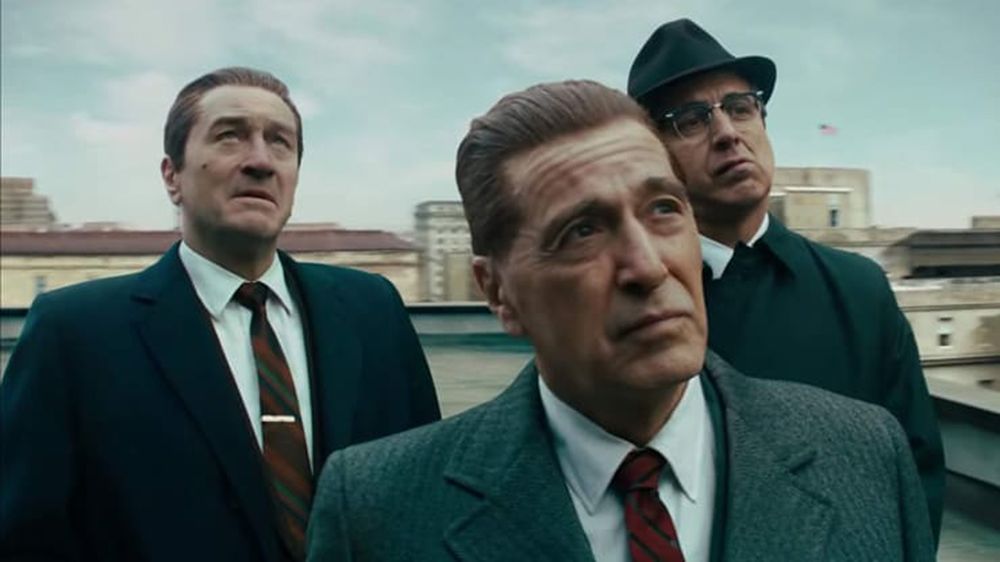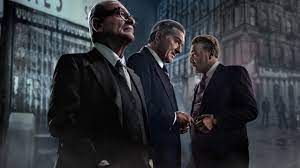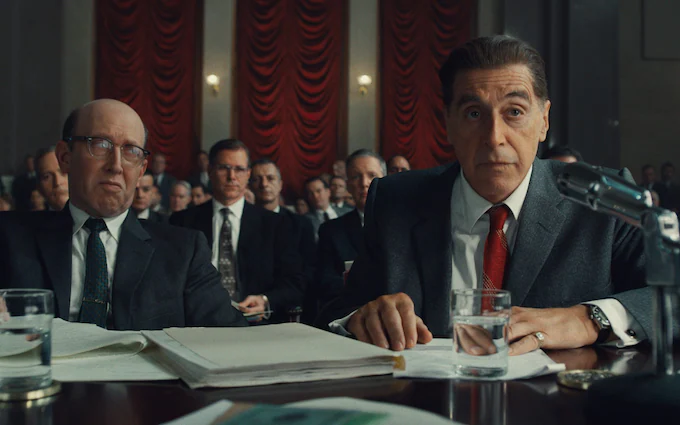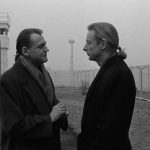The Irishman (2019)

Review: The Irishman (2019)
A Masterpiece of Crime, Time, and Redemption
Martin Scorsese’s The Irishman (2019) is a cinematic triumph that marks a return to the world of organized crime, a genre the director helped define with classics like Goodfellas (1990) and Casino (1995). With a runtime of 209 minutes, this epic film, based on Charles Brandt’s book I Heard You Paint Houses, chronicles the life of Frank Sheeran (Robert De Niro), a World War II veteran turned mobster, who becomes deeply entangled in the affairs of the Bufalino crime family and the mysterious disappearance of union leader Jimmy Hoffa (Al Pacino). While Scorsese’s latest film takes a more reflective, somber approach compared to his earlier crime works, it is no less captivating, offering a profound meditation on loyalty, regret, and the passage of time.
Plot Overview
The Irishman spans several decades, weaving a complex narrative that follows Frank Sheeran’s rise and fall within the criminal underworld. Sheeran, an aging hitman, recounts his story from the 1950s to the 1970s, detailing his connection to the powerful mob boss Russell Bufalino (Joe Pesci) and his involvement with Hoffa, the charismatic leader of the International Brotherhood of Teamsters. As Frank becomes increasingly entangled with Hoffa, his loyalty to his family and his moral compass begin to erode, leading to a series of tragic events. The film is framed as Frank’s confessional account of his life and the consequences of his choices, particularly his role in Hoffa’s disappearance.

The Good: Masterful Direction, Strong Performances, and Emotional Depth
1. Scorsese’s Direction and Storytelling
Martin Scorsese, once again, demonstrates why he is a master of crime cinema. The Irishman is a carefully crafted work that balances the grandeur of organized crime with a more introspective, slow-burning narrative. Scorsese’s direction allows the film to unfold at its own pace, providing time for reflection and character development, which is a stark contrast to the more fast-paced nature of his previous films. The story is rich in detail, with layered characters whose motivations and actions reveal themselves gradually, reflecting the passage of time and the changing nature of Frank’s world.
The use of de-aging technology, which allows the actors to play their characters across different stages of life, is seamlessly integrated into the narrative. Though some viewers may find the effects distracting at times, they help underscore the film’s theme of time and its irreversible effects, making the decades-long journey of Frank Sheeran more tangible and immersive.
2. Phenomenal Performances
The performances in The Irishman are nothing short of spectacular. Robert De Niro delivers a haunting portrayal of Frank Sheeran, capturing the character’s internal conflict, guilt, and weariness. De Niro’s Frank is a man shaped by violence but also a man who recognizes the futility of his actions in hindsight. He brings depth and nuance to the role, portraying Frank’s emotional journey as a series of quiet, reflective moments rather than loud, explosive ones.
Joe Pesci’s turn as Russell Bufalino is a revelation. Known for his often fiery and volatile performances, Pesci brings a subdued, almost serene quality to his portrayal of the mob boss. His performance is all about control, power, and the subtle manipulation of those around him. Pesci, who had largely stepped away from acting, proves that his mastery of the craft has only deepened with age, and his presence in the film is a quiet but formidable force.
Al Pacino’s portrayal of Jimmy Hoffa is another standout, bringing the character’s larger-than-life personality and tragic flaws to the forefront. Pacino perfectly captures Hoffa’s charisma, his sense of injustice, and his self-destructive tendencies. The interactions between Pacino’s Hoffa and De Niro’s Sheeran are among the film’s most compelling, as they reveal the intricate dance between power, loyalty, and betrayal.
3. Emotional and Thematic Complexity
The Irishman excels not just as a crime film but as a meditation on regret, loyalty, and the passage of time. Frank’s narrative is one of reflection, looking back at his life with a mixture of resignation and sorrow. As the film explores the themes of mortality and lost time, it paints a portrait of a man who spent his life in service to a violent, corrupt world, only to find that the price of loyalty and power is personal destruction. The film asks difficult questions about the choices we make, the relationships we form, and the costs of pursuing power at the expense of everything else.
The film is also a poignant commentary on the fading nature of the mafia and the old-school way of life. The world Frank inhabits—one of organized crime, labor unions, and corrupt politics—is slipping away, leaving him with little more than the ghosts of his past. This melancholy, bittersweet tone infuses every scene, creating a reflective, somber atmosphere that permeates the entire film.
The Weaknesses: Length and Pacing
1. Length and Pacing
At over three and a half hours, The Irishman is undeniably long. While this extended runtime allows for a thorough exploration of its characters and themes, it can also feel meandering at times. Some viewers may find the pacing slow, especially in the middle portion of the film, where the action takes a backseat to character development and the gradual buildup of tension. While this reflective style is deliberate and effective in conveying the film’s central themes, the slow pace may be off-putting for those expecting a more traditional crime thriller.
The length also means that certain plot points, especially the final act, can feel drawn out. Some of the quieter moments, while emotionally rich, may test the patience of viewers more accustomed to faster-paced narratives. However, for those willing to invest the time, the film’s deliberate pacing rewards viewers with a more profound, layered experience.
Themes and Messages
The Irishman is a profound exploration of the choices we make and the consequences they carry. The central theme revolves around loyalty—Frank Sheeran’s unflinching devotion to his mob family and, most notably, to Hoffa, who becomes both a mentor and a tragic figure. However, the film also touches on the emptiness of that loyalty and the hollow nature of the life Frank has chosen. It serves as a sobering look at how violence, corruption, and ambition erode not only a person’s soul but also their connections to those around them.
The film’s meditation on time is another central theme, with Frank’s reflections on his past, his regrets, and the relationships he’s lost. The Irishman suggests that time is the one thing we can’t escape—no matter how much power, money, or loyalty we accumulate, we eventually face our own mortality. This is highlighted by the film’s melancholic tone and its quiet contemplation of aging, loneliness, and the fading of the world that Frank once inhabited.
Standout Moments
- The Opening Scene
The film opens with Frank Sheeran’s narration as he reflects on his life, setting the tone for the entire film. The use of long, drawn-out shots and the somber mood immediately establishes The Irishman as a film focused on reflection rather than action. This scene perfectly encapsulates the film’s slow burn and its emphasis on character-driven storytelling. - The De-Aging Technology
Though some critics have questioned the effectiveness of the de-aging technology used on De Niro, Pesci, and Pacino, it undeniably plays a significant role in telling the story of Frank’s life across several decades. The technology allows the actors to seamlessly portray their characters at various ages, enhancing the narrative’s sense of time and providing a deeper connection to the story. - The Final Moments
The film’s conclusion, where Frank reflects on his life and his choices, is as poignant as it is devastating. The final scenes of the film, marked by Frank’s somber musings about his past and his estrangement from his family, pack an emotional punch that lingers long after the credits roll.
Final Thoughts
The Irishman (2019) is an ambitious, meditative masterpiece that examines the costs of a life lived in the shadows of organized crime. Martin Scorsese’s direction is as precise and measured as ever, and the performances of Robert De Niro, Joe Pesci, and Al Pacino elevate the material to a level of depth and complexity rarely seen in crime dramas. While its length and pacing may be challenging for some, the film rewards those who are willing to invest the time with a powerful, introspective look at life, loyalty, and the passage of time. For fans of Scorsese’s previous works and lovers of slow-burn, character-driven stories, The Irishman is an undeniable triumph.
Rating: 9/10
A haunting and profound crime epic that cements Scorsese’s legacy while offering a deeply reflective look at life, loyalty, and regret.











